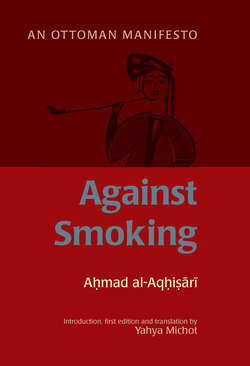Читать книгу Against Smoking - Ahmad al-Rumi al-Aqhisari - Страница 9
На сайте Литреса книга снята с продажи.
ОглавлениеPreface
CONTRARY to what is now claimed by dishonest or ignorant politicians opposed to its joining the EU, Turkey has for centuries been a major player on the European scene, culturally as much as politically. The Ottomans notably had a pivotal role in initiating “the West” not only to the delight of coffee drinking and the splendour of tulips, but also to the sensuous delirium of opium. For his reward, “the Turk” got literally “smoked”… According to the Egyptian Ibrāhīm al-Laqānī (d. 1041/1631), when the English, around 1600, by dissecting the corpse of a smoker, discovered that his heart had become “like a dry sponge, with big and small holes in it”, they banned the tobacco imported from their colonies in the New World and “exported it to the countries of Islam”. In the most amazing U-turn away from the teachings of a Prophet famous for his love of perfumes, the same Ottoman society which had elevated the creation and use of fragrances into one of the Beaux-arts, then succumbed, in just a few years, to the foul-smelling charm of the American poison. It would take centuries before lawmakers, in Turkey as well as in the EU or the US, impose warnings like “Tütün öldürüyor” or “Smoking kills” on cigarettes and other tobacco products. Various ulema realized the dangers of the new substance and addiction to it as soon as it spread amongst Muslims, but they were largely preaching in the wilderness, their forebodings and advice unheeded. This book presents the arguments of one of them and is dedicated to the noble memory of all his peers.
I now live and continue my academic pursuits in Hartford, the capital of Connecticut, a state famous for the high quality of the “wrapper” tobacco leaves it has been producing on an industrial scale for the last two centuries. My wife and I have just planted a Nicotiana in our front garden and, if it takes, will lovingly follow its growth over the next few months when, also, we will be able to enjoy the pleasure of walking between the flowering tobacco fields of the region. As for other direct experiences with the subject of this book, I am afraid there will be none since I do not smoke and my only – limited – expertise is of a philological nature. That being said, let it be known that I had great pleasure in exploring the world of Ottoman tobacco prohibitionists and it is this intellectual delectation which I hope to have been able to share with the reader.
I am grateful to the Director of the Süleymaniye Library for allowing me to examine Aḥmad al-Rūmī l-Aqḥisārī’s manuscripts during my stay in Istanbul in May 2008 and providing me with various sets of photographs on CD-ROM. My hearty thanks are due to the learned signatory of the Foreword and dearest brother, Shaykh Mohammad Akram Nadwi. My gratitude also goes to Marion Nielsen, curator and caretaker at the Luddy/Taylor Connecticut Valley Tobacco Museum, who graciously welcomed me and taught me all I needed to know about tobacco farming. I am most indebted to Omama Diab, Mustapha Sheikh and Jamil Qureshi, with whom I discussed this book, who read drafts of it and suggested several improvements. It was a privilege to speak of my research on al-Aqḥisārī, Ottoman puritanism, tobacco, “and other pleasures” with the students at Hartford Seminary in March 2009 and I benefited greatly from their questions and comments.
Yahya M. Michot
Jumādā I 1430 – May 2009
